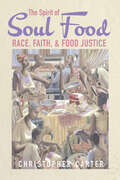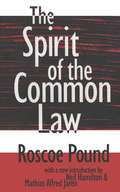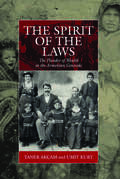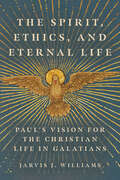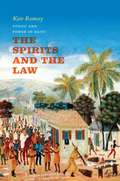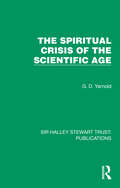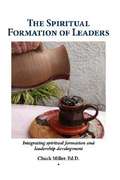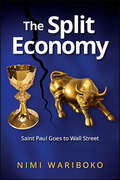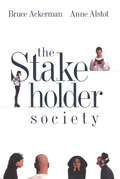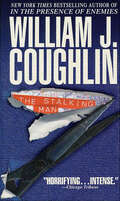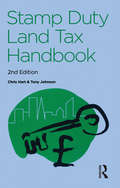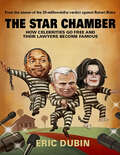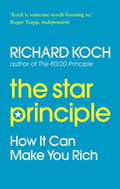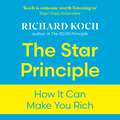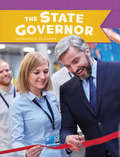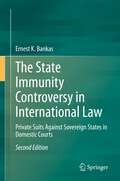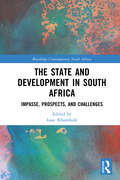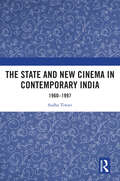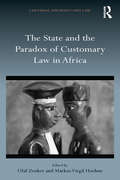- Table View
- List View
The Spirit of Soul Food: Race, Faith, and Food Justice
by Christopher CarterSoul food has played a critical role in preserving Black history, community, and culinary genius. It is also a response to--and marker of--centuries of food injustice. Given the harm that our food production system inflicts upon Black people, what should soul food look like today? Christopher Carter's answer to that question merges a history of Black American foodways with a Christian ethical response to food injustice. Carter reveals how racism and colonialism have long steered the development of US food policy. The very food we grow, distribute, and eat disproportionately harms Black people specifically and people of color among the global poor in general. Carter reflects on how people of color can eat in a way that reflects their cultural identities while remaining true to the principles of compassion, love, justice, and solidarity with the marginalized. Both a timely mediation and a call to action, The Spirit of Soul Food places today's Black foodways at the crossroads of food justice and Christian practice.
The Spirit of the Common Law
by Roscoe PoundThe Spirit of the Common Law is one of Roscoe Pound's most notable works. It contains the brilliant lectures he delivered at Dartmouth College in the summer of 1921. It is a seminal book embodying the spiritual essence of sociological jurisprudence by its leading prophet. This work is both a celebration of the common law and a warning for common law judges and lawyers to return to and embrace the pragmatism and judicial empiricism that define and energize the common law. The two fundamental doctrines of the common law, Pound writes, are the doctrine of precedents and the doctrine of supremacy of law.In an earlier preface, Justice Arthur J. Goldberg writes that The Spirit of the Common Law will always be treasured by judges and lawyers for its philosophy and history, but more importantly for Roscoe Pound's optimism and faith in the capacity of law to keep up with the times without sacrificing fundamental values. It is a faith built upon the conviction that the present is not to be divorced from the past, but rather that the past and the present are to be built upon to make a better future. Neil Hamilton and Mathias Alfred Jaren provide a biographical introduction to the book. They discuss the various influences upon Pound's scholarly pursuits and they analyze many of his writings that led up to The Spirit of the Common Law. This volume is a necessary addition to the libraries of legal scholars and professionals, sociologists, and philosophers.
The Spirit of the Laws: The Plunder of Wealth in the Armenian Genocide
by Taner Akçam Umit KurtPertinent to contemporary demands for reparations from Turkey is the relationship between law and property in connection with the Armenian Genocide. This book examines the confiscation of Armenian properties during the genocide and subsequent attempts to retain seized Armenian wealth. Through the close analysis of laws and treaties, it reveals that decrees issued during the genocide constitute central pillars of the Turkish system of property rights, retaining their legal validity, and although Turkey has acceded through international agreements to return Armenian properties, it continues to refuse to do so. The book demonstrates that genocides do not depend on the abolition of the legal system and elimination of rights, but that, on the contrary, the perpetrators of genocide manipulate the legal system to facilitate their plans.
The Spirit, Ethics, and Eternal Life: Paul's Vision for the Christian Life in Galatians
by Jarvis J. WilliamsWhat should the Christian life look like? What vision does Scripture cast for living as a follower of Christ? The New Testament scholar Jarvis Williams considers how Paul's letter to the Galatians can inform our understanding of the Christian life here and now as well as into eternity. What emerges from this careful study is a multifaceted vision of God's saving action in Jesus Christ for both Jew and Gentile, in both the vertical relationship between God and humanity as well as the horizontal relationships among people—with cosmic ramifications. Through Paul's instructions and Williams's interpretation, Christians can learn the importance of walking by the Spirit.
The Spirits and the Law: Vodou and Power in Haiti
by Kate RamseyVodou has often served as a scapegoat for Haiti’s problems, from political upheavals to natural disasters. This tradition of scapegoating stretches back to the nation’s founding and forms part of a contest over the legitimacy of the religion, both beyond and within Haiti’s borders. The Spirits and the Law examines that vexed history, asking why, from 1835 to 1987, Haiti banned many popular ritual practices. To find out, Kate Ramsey begins with the Haitian Revolution and its aftermath. Fearful of an independent black nation inspiring similar revolts, the United States, France, and the rest of Europe ostracized Haiti. Successive Haitian governments, seeking to counter the image of Haiti as primitive as well as contain popular organization and leadership, outlawed “spells” and, later, “superstitious practices. ” While not often strictly enforced, these laws were at times the basis for attacks on Vodou by the Haitian state, the Catholic Church, and occupying U. S. forces. Beyond such offensives, Ramsey argues that in prohibiting practices considered essential for maintaining relations with the spirits, anti-Vodou laws reinforced the political marginalization, social stigmatization, and economic exploitation of the Haitian majority. At the same time, she examines the ways communities across Haiti evaded, subverted, redirected, and shaped enforcement of the laws. Analyzing the long genealogy of anti-Vodou rhetoric, Ramsey thoroughly dissects claims that the religion has impeded Haiti’s development.
The Spiritual Crisis of the Scientific Age (Sir Halley Stewart Trust: Publications)
by G. D. YarnoldFirst published in 1959, the original blurb reads: “No good purpose is served today by treating the relationship between Christianity and the natural sciences as a conflict; even as a conflict to be resolved. The modern world is passing through a crisis of far-reaching proportions; which is the direct consequence of its inability to assimilate new scientific knowledge, and to direct rightly the new technical skills. The crisis, which is essentially spiritual in character, is examined in its three principal aspects. Accordingly, the first part of the book deals with our understanding of the order of nature; the second with some of the central doctrines of the Christian faith; and the final section with the pressing ethical and moral problems of the industrial and nuclear age.” Today it can be read and enjoyed in its historical context.This book is a re-issue originally published in 1959. The language used and views portrayed are a reflection of its era and no offence is meant by the Publishers to any reader by this re-publication.
The Spiritual Formation of Leaders
by Chuck Miller"The Spiritual Formation of Leaders" invites readers to deeper intimacy with Christ so, in Him, they will be empowered to enjoy rich community with one another and a life of fruitful ministry. (Christian) Chuck Miller has lived what he teaches. The book brings together spiritual formation/discipleship and leadership development. Should be required reading for every Christian leader.
The Splendid Blond Beast: Money, Law, and Genocide in the Twentieth Century (Forbidden Bookshelf #24)
by Christopher SimpsonFrom a National Jewish Book Award–winning author: The &“revelatory and shocking&” investigation into the CIA&’s liberation of Nazi war criminals (Kirkus Reviews). How did Gen, Karl Wolff, one of the highest-ranking members of the Nazi Party&’s Waffen-SS, who personally oversaw the deportation of three hundred thousand Jews to the Treblinka extermination camps, escape prosecution at the Nuremberg trials? As revealed in this groundbreaking investigation—culled from recently uncovered archival documents—the answer lies within the US government, which buried reports on the Final Solution and was complicit in the recruitment of Nazi war criminals, all to protect the world economy. Among the key players was CIA director Allen Dulles, who was not only instrumental in Wolff&’s exoneration but also responsible for installing former slave-labor specialists into positions of power in postwar Germany. In this damning exposé of American government malfeasance, author Christopher Simpson traces the roots of mass murder as an instrument of financial gain and state power, from the Armenian genocide during World War I to Hitler&’s Holocaust through the practice of genocide today. Detailing how the existing structures of international law and commerce have encouraged mass killings, corporate looting, and profiteering at the expense of innocent victims, The Splendid Blond Beast is a disturbing and profound book about the success of evil in our time. The award-winning author of Blowback and Science of Coercion, Simpson also served as research director for Marcel Ophüls&’s Oscar-winning documentary, Hôtel Terminus: The Life and Times of Klaus Barbie.
The Split Economy: Saint Paul Goes to Wall Street (SUNY series in Theology and Continental Thought)
by Nimi WaribokoStarting with Marx and Freud, scholars have attempted to identify the primary ethical challenge of capitalism. They have named injustice, inequality, repression, exploitative empires, and capitalism's psychic hold over all of us, among other ills. Nimi Wariboko instead argues that the core ethical problem of capitalism lies in the split nature of the modern economy, an economy divided against itself. Production is set against finance, consumption against saving, and the future against the present. As the rich enjoy their lifestyle, their fellow citizens live in servitude. The economy mimics the structure of our human subjectivity as Saint Paul theorizes in Romans 7: the law constitutes the subject as split, traversed by negativity. The economy is split, shot through with a fundamental antagonism. This fundamental negativity at the core of the economy disturbs its stability and identity, generating its destructive drive. The Split Economy develops a robust theoretical framework at the intersection of continental philosophy, psychoanalytic theory, theology, and political economy to reveal a fundamental dynamic at the heart of capitalism.
The Sports Doping Market
by Letizia Paoli Alessandro DonatiThis book examines sports doping from production and distribution, detection and punishment. Detailing the daily operations of the trade and its gray area as a semi-legal market, the authors cover important issues ranging from athletes most at risk to the role of organized crime in sports doping, and whether sports governing bodies are enabling the trade. Challenges for law enforcement and legislation, and efforts to control PED use in the worldwide sports community and among aspiring athletes, are also discussed in depth. The book's extensive research:* Estimates the demand for performance-enhancing products. * Traces the route from legal substances to illegal uses. * Identifies classes of suppliers and their methods of operation. * Tracks typical distribution systems from suppliers to users. * Examines the economics of the market: prices, profits, revenue. * Assesses the state of anti-doping law enforcement efforts. Starting with an unprecedented case study in Italy, the intense scrutiny from one pivotal country yields a potential template for research and policy on a world scale. Doping and Sport makes solid contributions to the work of researchers in criminology and criminal justice, particularly with an interest in corruption, drug trafficking, and criminal networks; researchers in sports science and public health; and policymakers.
The Spotted Cats (The Brady Coyne Mysteries #10)
by William G. TapplyIn this &“practiced and talented&” mystery, the Boston lawyer travels from Cape Cod to rural Montana to track down a hunter&’s stolen trophies (Library Journal). Six years after the leopard attack that ended his career as a professional hunter, Jeff Newton is broken, crippled, and ready to die. His only pleasure is the occasional visit from Brady Coyne, Jeff&’s no-nonsense Boston lawyer who&’s come to Cape Cod to pay his respects to the old man. As always, Brady is entranced by the ex-hunter&’s houseful of trophies, none more dazzling than the seven Mexican leopard figurines. Solid-gold statues with jewels for eyes, they are priceless, beautiful—and about to be stolen. The thieves club Jeff, cut Brady, and escape with the golden cats, leaving the two men for dead. Jeff ends up in a coma, and Brady sets out to retrieve the trophies. If the old hunter ever wakes up, Brady wants the leopards to be there to greet him.
The Stage Producer's Business and Legal Guide
by Charles GrippoThe entire range of individuals involved in entertainment-performers, writers, and directors to box office managers, theater board members, and theater owners-will find comprehensive answers to questions on every aspect of theater business and law. Written by attorney, producer, and playwright, this book reveals hundreds of insider strategies for minimizing legal costs, negotiating contracts, and licensing and producing plays. It also features expert, practical advice on such topics as tax risks and liabilities, safety regulations, organizing the theater company, financing, box office management, not-for-profit management, and much more. Plus everything is explained clearly, written without a lot of legal jargon.
The Stage Producer's Business and Legal Guide (Second Edition)
by Charles GrippoExpert, Practical Advice for Everyone in Show Business Now updated and expanded, this second edition of The Stage Producer’s Business and Legal Guide is the ultimate survival kit for anyone presenting live entertainment. The information contained in this handbook is essential for those working in Broadway, regional, stock, or university theater; concert halls; opera houses; and more. Attorney, producer, and playwright Charles Grippo provides comprehensive advice on every aspect of the theater business and the law, including: Crowdfunding Your ProductionNew Opportunities to Raise MoneySelf-ProductionLicensing and Producing PlaysDevised Theater and CollaborationsCreating Jukebox MusicalsOrganizing a Theater CompanyTheatrical InsuranceMaintaining a Harassment-Free EnvironmentNegotiating ContractsEssential Rules Every Board Member Must KnowManaging a Not-for-Profit Theater CompanyNavigating TaxesUsing Third-Party Intellectual PropertyAnd much, much more! The entire range of individuals involved in entertainment—producers, performers, writers, directors, managers, and theater owners—will find invaluable practical and legal advice in this handy guide.
The Stakeholder Society
by Bruce AckermanA quarter century of trickle-down economics has failed. Economic inequality in the United States has dramatically increased. Many, alas, seem resigned to this growing chasm between rich and poor. But what would happen, ask Bruce Ackerman and Anne Alstott, if America were to make good on its promise of equal opportunity by granting every qualifying young adult a citizen's stake of eighty thousand dollars? Ackerman and Alstott argue that every American citizen has the right to share in the wealth accumulated by preceding generations. The distribution of wealth is currently so skewed that the stakeholding fund could be financed by an annual tax of two percent on the property owned by the richest forty percent of Americans.Ackerman and Alstott analyze their initiative from moral, political, economic, legal, and human perspectives. By summoning the political will to initiate stakeholding, they argue, we can achieve a society that is more democratic, productive, and free. Their simple but realistic plan would enhance each young adultís real ability to shape his or her own future. It is, in short, an idea that should be taken seriously by anyone concerned with citizenship, welfare dependency, or social justice in America today.
The Stalking Man
by William J. CoughlinIn a twisted trail of blood, he spelled out his name, The Stalking Man, hunting women in cities across the country the way his father had once taught him to hunt deer. He loved the moment of terror frozen on their faces when the all-too-horrifying realization would hit them-they were going to die a death more violent and ghastly than their worst nightmares...They had caught him once-he did his time and now he was "cured." But he'd been sloppy then. This time he slithered through the country, striking with cunning and precision, laughing at the law as he outran them again and again. Now two men must piece together his macabre clues and stop a sadistic killer who's about to strike too close to home...
The Stamp Duty Land Tax Handbook
by Tony Johnson Chris HartWritten from a practical standpoint, this new edition of the Stamp Duty Land Tax Handbook details how the updated legislation works in common practice. The book's examples and case studies will be highly useful to surveyors, valuers and anyone needs to be kept up to date with the application of tax duty on Land. Unlike most other books in this area, the Handbook is based on practical experience of the work of surveyors applying the latest legislation in making valuations. The authors explain the potential pitfalls and use examples of calculations of the amounts on which tax is payable. Complex areas like administration and enforcement are clarified and explained. The Handbook will help surveyors and property professionals provide crucial support to their invididual and corporate clients.
The Star Chamber: How Celebrities Go Free and Their Lawyers Become Famous
by Eric DubinIn the modern justice system, fame and fortune are virtually unbeatable. In this unprecedented look at celebrity trials, attorney Eric Dubin explores all the angles of how and why the rich and famous walk free, despite overwhelming evidence of guilt that surely would convict anyone else. From his years as a network legal consultant to winning trial lawyer in the $30 million Robert Blake wrongful death case, Dubin holds nothing back. Read about Eric' s L.A. jailhouse fight with Michael Jackson' s lawyer, his heavyweight showdown with actor Robert Blake on the witness stand, and how he beat the media at its own game. Dubin exposes the raw truth when the media circus invades the courthouse and the powerful effect it has on all participants— the defendant, lawyers, the jury, and even the judge— not to mention the final verdict.
The Star Principle: How it Can Make You Rich
by Richard KochRichard Koch has made over £100 million from spotting 'Star' businesses. In his new book, he shares the secrets of his success - and shows how you too can identify and enrich yourself from 'Stars'. Star businesses are ventures operating in a high-growth sector - and are the leaders in their niche of the market. Stars are rare. But with the help of this book and a little patience, you can find one, or create one yourself.THE STAR PRINCIPLE is a vital book for any budding entrepreneur or investor (of grand or modest means). It is also invaluable for any ambitious employee who realises the benefits of working for a Star venture - real responsibility, fast personal development, better pay, great bonuses and valuable share options.Whoever your are, identifying and investing in Stars will make your life much sweeter and richer in every way.
The Star Principle: How it can make you rich
by Richard KochRichard Koch has made over £100 million from spotting 'Star' businesses. In his new book, he shares the secrets of his success - and shows how you too can identify and enrich yourself from 'Stars'. Star businesses are ventures operating in a high-growth sector - and are the leaders in their niche of the market. Stars are rare. But with the help of this book and a little patience, you can find one, or create one yourself.THE STAR PRINCIPLE is a vital book for any budding entrepreneur or investor (of grand or modest means). It is also invaluable for any ambitious employee who realises the benefits of working for a Star venture - real responsibility, fast personal development, better pay, great bonuses and valuable share options.Whoever your are, identifying and investing in Stars will make your life much sweeter and richer in every way.
The Star Principle: How it can make you rich
by Richard KochRichard Koch has made over £100 million from spotting 'Star' businesses. In his new book, he shares the secrets of his success - and shows how you too can identify and enrich yourself from 'Stars'. Star businesses are ventures operating in a high-growth sector - and are the leaders in their niche of the market. Stars are rare. But with the help of this book and a little patience, you can find one, or create one yourself.THE STAR PRINCIPLE is a vital book for any budding entrepreneur or investor (of grand or modest means). It is also invaluable for any ambitious employee who realises the benefits of working for a Star venture - real responsibility, fast personal development, better pay, great bonuses and valuable share options.Whoever your are, identifying and investing in Stars will make your life much sweeter and richer in every way.
The State Governor (U.S. Government)
by Martha E. RustadWhat does a state governor do? Learn about the duties of a state governor, who can be a state governor, where they work, and how state governors are elected. Descriptive main text, full-color photos, fast facts, and callout definitions work together to support understanding.
The State Immunity Controversy in International Law: Private Suits Against Sovereign States in Domestic Courts
by Ernest K. BankasThe author shows through a careful analysis of the law that restrictive immunity does not have vox populi in developing countries, and that it lacks usus. He also argues that forum law, i.e. the lex fori is a creature of sovereignty and between equals before the law, only what is understood and acknowledged as law among states must be applied in as much as the international legal system is horizontal.
The State and Development in South Africa: Impasse, Prospects, and Challenges (Routledge Contemporary South Africa)
by Isaac KhambuleThis book interrogates the nexus between the state and development in post-apartheid South Africa. It highlights current problems, and suggests ways of consolidating state capabilities, improving public institutions and enhancing governance and development outcomes.Framed around developmental state theory, the book argues that the role of the state in South Africa will be fundamental for addressing the triple challenges of unemployment, poverty, and inequality. There is a growing concern that South Africa is at a development impasse, with ongoing crises in energy, infrastructure, and unemployment. The chapters investigate the role of the post-apartheid state in pursuing development and navigating a neoliberal globalised society. The book explores state capacity in all spheres of government, the relationship between politics and bureaucracy, and the role of state-owned enterprises in the country’s developmental aspirations. The book concludes by summarising the successes, challenges and lessons that have emerged over the course of the book; and anticipating future directions or possibilities for the state in South Africa’s development impasse.Bringing together leading voices in the field, this book will be an essential read for researchers of African politics, political economy and development. The book is also relevant for policymakers, students and practitioners in social sciences.
The State and New Cinema in Contemporary India: 1960–1997
by Sudha TiwariThis book examines the relationship between the newly independent Indian state and its New Cinema movement. It looks at state formative practices articulating themselves as cultural policy. It presents an institutional history of the Film Finance Corporation (FFC), later the National Film Development Corporation (NFDC), and their patronage of the New Cinema in India, from the 1960s to the 1990s, bringing into focus an extraordinary but neglected cultural moment in Indian film history and in the history of contemporary India. The chapters not only document the artistic pursuit of cinema, but also the emergence of a larger field where the market, political inclinations of the Indian state, and the more complex determinants of culture intersect — how the New Cinema movement faced external challenges from the industrial lobby and politicians, as well as experienced deep rifts from within. It also shows how the Emergency, the Janata Party regime, economic liberalization, and the opening of airwaves all left their impact on the New Cinema. The volume will be of great interest to scholars and researchers of film studies, politics and public policy, especially cultural policy, media and culture studies, and South Asian studies.
The State and the Paradox of Customary Law in Africa (Cultural Diversity and Law)
by Olaf Zenker Markus Virgil HoehneCustomary law and traditional authorities continue to play highly complex and contested roles in contemporary African states. Reversing the common preoccupation with studying the impact of the post/colonial state on customary regimes, this volume analyses how the interactions between state and non-state normative orders have shaped the everyday practices of the state. It argues that, in their daily work, local officials are confronted with a paradox of customary law: operating under politico-legal pluralism and limited state capacity, bureaucrats must often, paradoxically, deal with custom – even though the form and logic of customary rule is not easily compatible and frequently incommensurable with the form and logic of the state – in order to do their work as a state. Given the self-contradictory nature of this endeavour, officials end up processing, rather than solving, this paradox in multiple, inconsistent and piecemeal ways. Assembling inventive case studies on state-driven land reforms in South Africa and Tanzania, the police in Mozambique, witchcraft in southern Sudan, constitutional reform in South Sudan, Guinea’s long durée of changing state engagements with custom, and hybrid political orders in Somaliland, this volume offers important insights into the divergent strategies used by African officials in handling this paradox of customary law and, somehow, getting their work done.
